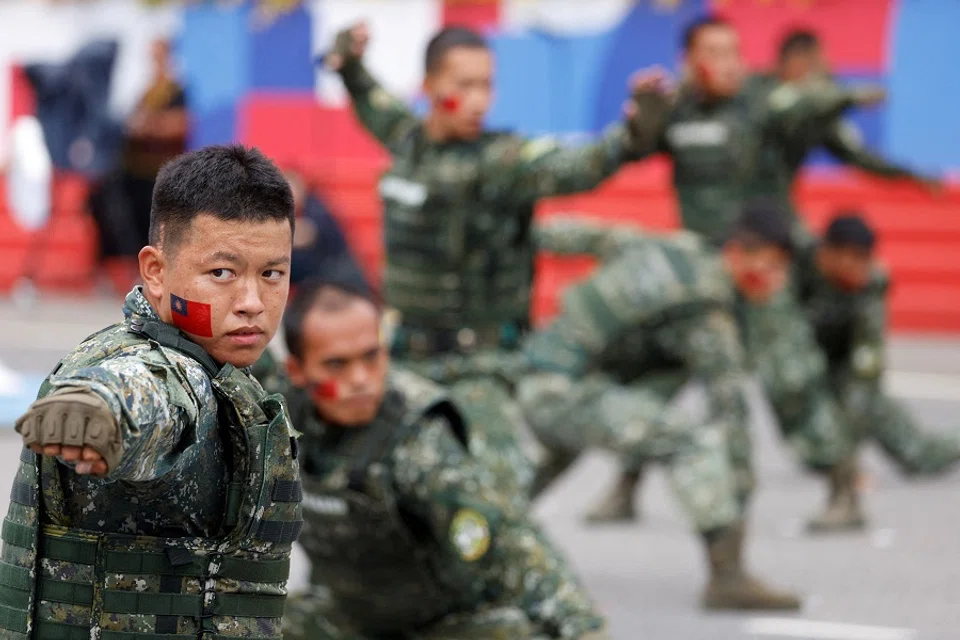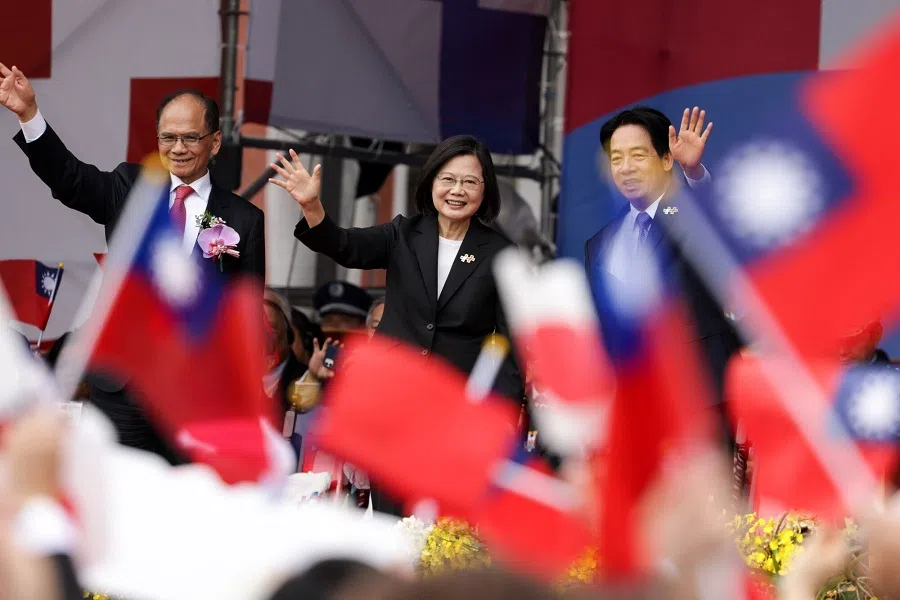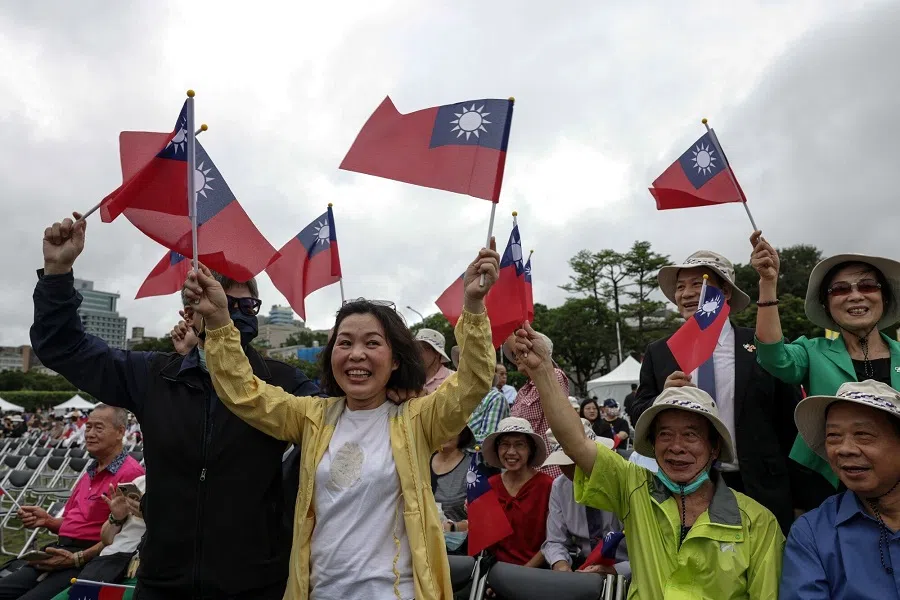Gaza, Ukraine crises have implications for Taiwan
The emerging war fatigue and the twin crises in Ukraine and Gaza have analysts weighing up the implications for Taiwan. Ultimately, the US can afford Ukraine's failure or even let the conflict in the Middle East continue, but it will do everything possible to keep Taiwan separate from China, says US academic Zhu Zhiqun.

The Israel-Hamas conflict reignited a hot spot in international security and aggravated problems facing the international community. Already, people in many countries have developed "war fatigue" as the Russia-Ukraine war drags on. Voices have grown louder in the US and other Western countries questioning why their governments continue to fund this disastrous war with no end in sight.
The emerging war fatigue and the twin crises in Ukraine and Gaza have implications for Taiwan. Will China take advantage of the current crises in Europe and the Middle East to attack Taiwan soon? Will the war fatigue translate into reduced support for Ukraine? Is the US commitment to support Taiwan reliable? Will the so-called "America skepticism" surge in Taiwan?
Another war must be avoided at all costs
These questions are worthy of serious consideration, but the biggest lesson from conflicts in Ukraine and Gaza for cross-strait relations is that war must be avoided with utmost effort. The international community absolutely does not want another war in the Taiwan Strait.
Taiwan's Democratic Progressive Party (DPP) government held a ceremony on 10 October (Double Ten Day) to celebrate the 112th anniversary of the founding of the Republic of China (ROC). Dissatisfied that the DPP government had called the Double Ten Day "Taiwan National Day" in English, publicly promoting "Taiwan independence", former President Ma Ying-jeou refused to attend this year's official Double Ten Day celebration. Subsequently, many figures from the pan-Blue camp followed suit, and the Kuomintang held its own flag-raising ceremony to celebrate the National Day of the ROC.
Ma's message has been consistent: to avoid war, both sides of the Taiwan Strait must follow the "one China"-based "1992 Consensus". Unfortunately, the DPP smashed this foundation for cross-strait dialogue when Tsai Ing-wen came to office in 2016.
... as long as the Taiwan authorities still agree to "one China" or refer to themselves as the ROC, Beijing can live with it.

Those who do not understand Chinese history, the present quarrel between the pan-Blue (pro-"one China") and pan-Green (pro-Taiwan independence) camps in Taiwan, or the nuances in Taiwan's names will probably not be able to figure out the problem here. Many people do not understand why Double Ten is not "Taiwan National Day".
DPP presidential candidate: mixing apples and oranges
For all practical reasons, the government of the People's Republic of China (PRC) in Beijing will not recognise the government of the ROC which it believes became history in 1949. However, as long as the Taiwan authorities still agree to "one China" or refer to themselves as the ROC, Beijing can live with it. When the two sides follow the 1992 Consensus, cross-strait relations will not be at risk of war, as evidenced during Ma's term (2008-2016). But if the Taiwanese government denies that the two sides of the Taiwan Strait belong to "one China", or pursues Taiwan independence or even provocatively claims that Taiwan is already independent thus altering the status quo, there will be no peace in the Taiwan Strait.
William Lai, the DPP's candidate for the 2024 ROC presidential election, used to call himself a "pragmatic worker for Taiwan independence". Recently he has modified his narrative, saying that if he wins the 2024 election, he will not promote Taiwan independence, and there is no need to declare Taiwan independence because Taiwan is already a sovereign and independent state. Lai is mixing apples and oranges and is apparently advocating Taiwan independence under the name of ROC.
... the US can afford Ukraine's failure or even let the conflict in the Middle East continue, but it will do everything possible to keep Taiwan separate from China.

When did Taiwan become independent? There has never been an internationally recognised independent country named Taiwan. The Double Ten Day celebrates the 10 October 1911 Wuchang uprising that led to the collapse of the Qing dynasty and the founding of the ROC. Taiwan was a colony of Japan then and was returned to the ROC after Japan's defeat at WWII in 1945. The DPP and other pro-independence groups dream of establishing an independent "Republic of Taiwan". This is unrealistic and not supported by the international community including the US.
US will treat conflict in the Taiwan Strait differently
Today, Taiwan has become strategically more valuable for the US due to US-China rivalry. Washington is fully aware that Beijing considers Taiwan its "core" national interest. Frankly speaking, the US can afford Ukraine's failure or even let the conflict in the Middle East continue, but it will do everything possible to keep Taiwan separate from China. The US views China as the only country having the capability and intent to unseat its global dominance.
The claim by some US politicians that "stopping funding for Ukraine would be a death sentence for Taiwan" because a Russian victory could encourage China to launch an attack on Taiwan is mistaken, misleading and ill-advised. It is mistaken because it underestimates the strategic value of Taiwan to the US and the utility of the Taiwan card against China. It is misleading because it assumes that China's attack on Taiwan is imminent and inevitable, when there is no indication that China will use force to unify with Taiwan soon.
The stronger US support for Taiwan and the more arms sales to Taiwan, the more likely Beijing will use force to achieve unification.

Some people believe that China will be deterred from using force as long as the US keeps arming Taiwan. This ill-advised thinking misjudges Beijing's determination and is actually counterproductive. The stronger US support for Taiwan and the more arms sales to Taiwan, the more likely Beijing will use force to achieve unification.
Washington must be prudent to balance its desire to support Taiwan and its commitment to "one China". No matter how much the US wants to support democracy in Taiwan, it should not corner Beijing and make Beijing feel that the door to peaceful reunification is slammed shut. Keeping Taiwan permanently separate is unacceptable to Beijing just as it is unsustainable for Washington.
...the PRC leadership must realise that conditions for unification are lacking and most Taiwanese do not want to join China under the current political system.

The wars in Ukraine and Gaza will have little impact on China's long-term goals; Beijing is likely to follow its own pace to promote gradual cross-strait integration. However, the PRC leadership must realise that conditions for unification are lacking and most Taiwanese do not want to join China under the current political system. Beijing faces an uphill battle and must be more creative in attracting the Taiwanese.
Beijing's stated long-term goal of achieving peaceful reunification with Taiwan remains unchanged so far. If unprovoked, Beijing is unlikely to use force against Taiwan. Those who care about Taiwan's future should work hard to promote dialogue and peace across the Taiwan Strait instead of unnecessarily provoking Beijing and thus triggering a war. They should also urge the new leader who wins the January 2024 election in Taiwan to be realistic and return to the "one China" based foundation for cross-strait exchanges.




![[Big read] When the Arctic opens, what happens to Singapore?](https://cassette.sphdigital.com.sg/image/thinkchina/da65edebca34645c711c55e83e9877109b3c53847ebb1305573974651df1d13a)
